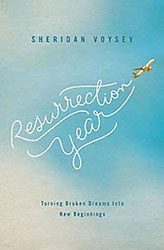 [This post is part of a roundtable conversation on the new book, Resurrection Year by Sheridan Voysey, now featured at the Patheos Book Club.]
[This post is part of a roundtable conversation on the new book, Resurrection Year by Sheridan Voysey, now featured at the Patheos Book Club.]
Sheridan Voysey’s Resurrection Year is a testament to faith and honesty. It opens the door for faithful Christians to take theology seriously and go beyond the rote recitation of “orthodox” doctrines, especially when time after time our prayers remain unanswered.
Author Madeleine L’Engle describes a question she once received following a lecture at a Christian college. One of the attendees asked the author, “Do you believe in God without any doubts?” L’Engle replied, “I believe with all my doubts.” As theologian Paul Tillich once asserted, doubt is not antithetical to faith, but reflects the depth with which we take our faith. In like fashion, Voysey’s struggle to understand God reveals the depth of their faith and willingness to take God seriously even when God appears to be absent.
After repeated failures to conceive a child, Sheridan and Merryn Voysey have a crisis of faith. They believe in God, but they struggle with the absence of God. Like many Christians, they believe that God answers prayers and supplies their needs, but their prayers remain unanswered. Resurrection Year chronicles their struggle to experience God’s presence in a world with no guarantees. Merryn’s and Sheridan’s struggle is biblical in character: after all, the Psalmists cry out to an absent God. The Psalmist’s cries of absence are testimony to their faith in God.
As I read of Sheridan’s and Merryn’s theological struggles, I pondered the importance of our concepts of God. Despite the evangelical focus on a personal relationship with God, often evangelicals hold impersonal or subpersonal doctrines of God. Their presumed orthodoxy often creates theological crises which can only be remedied by images of God that embrace change, relationship, and open-endedness.
Merryn and Sheridan ponder the relationship between divine power and love as it relates to thir infertility. Orthodox evangelicalism tends to assert, as they note, that “everything that happens is God’s will either because it’s been allowed or preordained.” This viewpoint suggests that suffering ultimately emerges from God’s will. They honestly ask, “If God has already preordained or allowed suffering to happen, what good is it to ask God [in prayer] to change things?”
In their dialogue with Greg Boyd’s Is God to Blame, the couple wonders if they have been wrong in their understanding of God. Could it be, they ask, that God is not in control of everything and that some things, including their infertility, has nothing to do with God’s will? God is not responsible for their infertility; it is simply out of God’s control. Or is it? Sheridan tentatively concludes that God really has two wills: God’s permissive and God’s perfect will. “In this imperfect, fallen, world, God permits things God hates.” But, divine permission of evil and suffering often leads to destruction and damnation (that is, if you believe in damnation). No good parent would permit events that ultimately destroy her or his children, even if he or she allows children to make mistakes on the pathway to maturity.
Yet, is this answer spiritually and theologically satisfactory? Sheridan is clear that his explanation cannot satisfy his wife. This couple’s theological crisis begs the questions: What is more important divine love or divine power? Can we trust a God who must deal, like ourselves, with powers that act independently of God? Can we love a God who is ultimately responsible for the suffering we experience? Moreover, is prayer a sham if God has already decided the future without our input? Can we sustain the practice of prayer if our prayers make no difference to God or to those for whom we pray?
While we can never fully fathom God’s nature, I believe that some visions of God are healthier than others; some are more consistent with the healer Jesus who proclaimed that he came that we might have life in all its abundance. Jesus confronted suffering in all of its forms – physical, spiritual, social, and relational. If Jesus reveals God’s true nature, then God cannot have two wills – perfect and permissive – but one will, aiming toward life in all its abundance for all creatures without ambiguity.
God’s presence and power are defined by love and relationship. God empowers and nurtures, God does not coerce or dominate. We live in a dynamic and interdependent universe in which each event emerges from many causes. From this perspective, God is one of many causes for each event. Our health and well-being results from the impact of DNA, family of origin, environment, quality of medical care, diet, attitudes, spiritual maturity, our prayers and the prayers of others, and the ubiquitous presence of God. God acts within a multitude of causal factors, naturalistically.
While certain moments in life may be perceived as miraculous in nature, these “miracles” are not the result of arbitrary supernatural intervention, but heightening of God’s presence in normal cause and effect relationships. The problem with supernaturalism is that presumes divine favoritism and upsets the causal order for some but not others. It also assumes that divine causation is unilateral rather than relational.
While faith may be a factor in the quality of our lives, it does not always guarantee safe passage in our complex and interdependent world. Still, visions of an unambiguous loving God nurture a lively faith that awakens us to the possibility that when there is not a cure, there can always be a healing, a sense of communion with a faithful and loving God. God is on our side in both failure and success, and nothing can separate us from the love of God.












